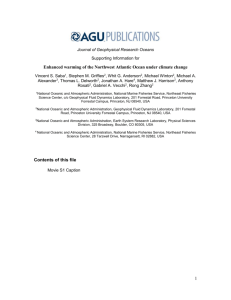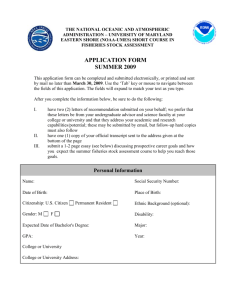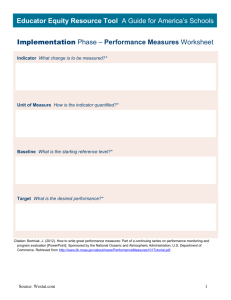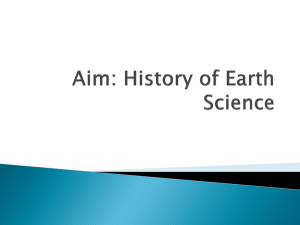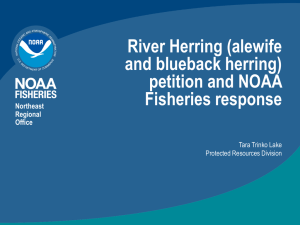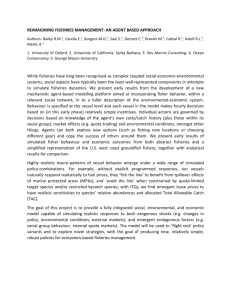Assessing the Accuracy of High Spatial Resolution Effort Data
advertisement
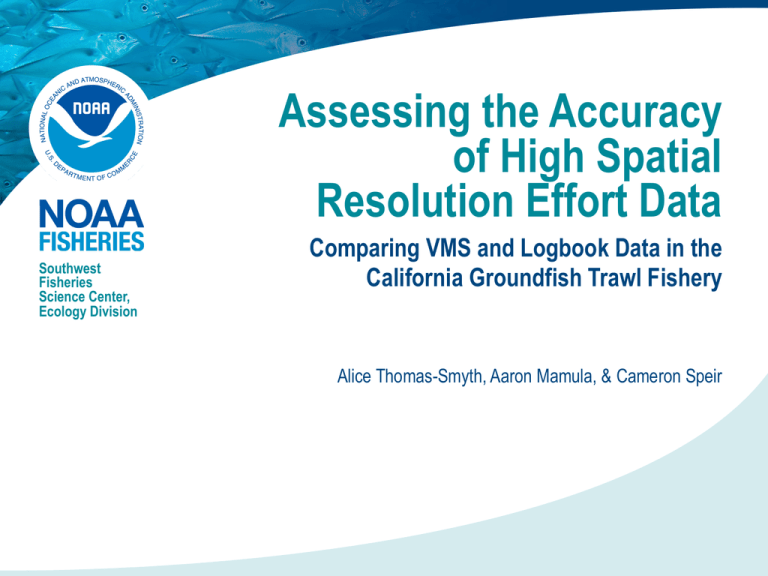
Assessing the Accuracy of High Spatial Resolution Effort Data Southwest Fisheries Science Center, Ecology Division Comparing VMS and Logbook Data in the California Groundfish Trawl Fishery Alice Thomas-Smyth, Aaron Mamula, & Cameron Speir Objective Quantify error in the self-reported data of the California Groundfish trawl fishery using fine-scale spatial data for the years 2007-2011 to assess whether logbooks are an appropriate source of information for spatial analysis and to what scale the information is accurate. Data • Logbook data provides a historical record of fishing activity in the West Coast fisheries, however this data is self-reported • Vessel monitoring system (VMS) data provides fine-resolution spatial and temporal data, however is only recently available and contains no vessel or activity information U.S. Department of Commerce | National Oceanic and Atmospheric Administration | NOAA Fisheries | Page 2 Data - VMS Data Points Vessels Raw 22,081,317 1,139 Study area 20,522,715 1,134 Removed speeds and spikes 19,180,243 1,036 Removed ports 4,583,006 983 Fishing activity 1,017,613 973 U.S. Department of Commerce | National Oceanic and Atmospheric Administration | NOAA Fisheries | Page 3 Data - Logbook Year Vessels Trips Tows 2007 69 1,976 7,682 2008 62 1,883 7,711 2009 55 2,078 7,826 2010 58 1,884 6,505 2011 48 1,469 5,609 U.S. Department of Commerce | National Oceanic and Atmospheric Administration | NOAA Fisheries | Page 4 Methods – identify fishing activity in VMS U.S. Department of Commerce | National Oceanic and Atmospheric Administration | NOAA Fisheries | Page 5 Methods – identify fishing activity in VMS U.S. Department of Commerce | National Oceanic and Atmospheric Administration | NOAA Fisheries | Page 6 Methods – tow path construction • Straight line • Bathymetry contours • Least-cost path • Change in bathymetry from set and up average depth U.S. Department of Commerce | National Oceanic and Atmospheric Administration | NOAA Fisheries | Page 7 Methods – matching the data • No way to identify individual trips or tows in the VMS data • Vessel days are units of comparison between the data • Trips in this fishery tend to be short, 1-3 days • Average distance per vessel day Original Logbook Data Original VMS Data Matched Data Vessel Days 13,951 165,507 7,508 Number of Recordsa 35,334 4,583,006 18,193 87 973 69 9,290 -- 4,571 456 17,498,311 -- Unique Vessels Unique Trips Removed Records a. Each logbook records is trawl tow consisting of set and up points. Each VMS record is a point consisting of a position, time, speed, and bearing. Each record in the matched data is a trawl tow, either from the logbook or constructed from consecutive points in the VMS data. U.S. Department of Commerce | National Oceanic and Atmospheric Administration | NOAA Fisheries | Page 8 Results Straight line distance (km) Year Vessel Days Avg Median Std. Dev Min Max 2007 385 6.7195 1.43 33.2257 0.0096 622.6739 2008 1745 6.3975 2.2826 12.4967 0.0082 124.7562 2009 2464 7.8560 2.9384 12.5955 0.0154 132.9931 2010 1734 7.3914 2.7175 18.1061 0.0079 448.1858 2011 1180 6.5925 2.4612 12.9976 0.0094 114.5433 All years 7508 6.9914 2.3669 17.8843 0.0101 288.6305 Bathymetry line distance (km) Year Vessel Days Avg 6.4994 Median 1.09 Std. Dev 32.4420 Min 0.0217 Max 604.2819 2007 385 2008 1745 6.3958 2.2198 12.5531 0.0046 124.7528 2009 2464 7.6804 2.6915 12.6336 0.0104 132.9627 2010 1734 6.2094 2.2690 17.0049 0.0398 448.1811 2011 1180 6.4348 2.1894 13.0296 0.0498 114.5202 All years 7508 6.7894 2.2673 15.3924 0.0046 604.2819 Set and up logbook points and nearest VMS fishing point distance (km) Year Vessel Days Avg 9.1947 Median 3.4533 Std. Dev 32.7166 Min Max 0.2396 606.2721 2007 385 2008 1745 6.5738 2.7450 12.2941 0.0702 121.7944 2009 2464 6.8644 2.5452 11.7657 0.0669 142.4202 2010 1734 6.6534 2.3614 16.9603 0.0486 445.8807 2011 1180 6.6399 2.0731 13.5149 0.0787 All years 7508 6.8337 2.5299 15.1865 0.0486 606.2721 114.0566 U.S. Department of Commerce | National Oceanic and Atmospheric Administration | NOAA Fisheries | Page 9 Results - straight line vs bathymetry U.S. Department of Commerce | National Oceanic and Atmospheric Administration | NOAA Fisheries | Page 10 Results – set and up points U.S. Department of Commerce | National Oceanic and Atmospheric Administration | NOAA Fisheries | Page 11 Results – examining error (directionality) U.S. Department of Commerce | National Oceanic and Atmospheric Administration | NOAA Fisheries | Page 12 Results – examining error (hang time) Logbook tow hang time distance (km) Year Trawls Avg 2007 7682 0.9784 Median 0.2225 Std. Dev 2.4102 Min 0 Max 106.1484 2008 7712 1.0880 0.3668 1.4426 0 29.1300 2009 7826 0.9612 0.2396 1.3759 0 28.4577 2010 6298 1.0044 0.2567 2.6647 0 178.0504 2011 5609 0.8355 0.2246 1.1955 0 15.2121 All years 35127 0.9805 0.2586 1.9122 0 178.0504 U.S. Department of Commerce | National Oceanic and Atmospheric Administration | NOAA Fisheries | Page 13 Conclusions • Lack of systematic directional error in the logbook data • Speed-based criteria for fishing activity classification in VMS data feasible to allow for fine spatial resolution analysis of catch data • Straight line tow paths are accurate representation of fishing activity in this fishery • However a new method to draw tow paths bathymetrically is now available U.S. Department of Commerce | National Oceanic and Atmospheric Administration | NOAA Fisheries | Page 14
